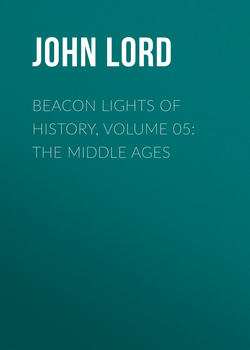Beacon Lights of History, Volume 05: The Middle Ages

Реклама. ООО «ЛитРес», ИНН: 7719571260.
Оглавление
John Lord. Beacon Lights of History, Volume 05: The Middle Ages
MOHAMMED.1
AUTHORITIES
CHARLEMAGNE
AUTHORITIES
HILDEBRAND
AUTHORITIES
SAINT BERNARD
AUTHORITIES
SAINT ANSELM
AUTHORITIES
THOMAS AQUINAS
AUTHORITIES
THOMAS BECKET
AUTHORITIES
THE FEUDAL SYSTEM
AUTHORITIES
THE CRUSADES
AUTHORITIES
WILLIAM OF WYKEHAM
AUTHORITIES
JOHN WYCLIF
AUTHORITIES
Отрывок из книги
The most extraordinary man who arose after the fall of the Roman Empire was doubtless Mohammed; and his posthumous influence has been greater than that of any man since Christianity was declared, if we take into account the number of those who have received his doctrines. Even Christianity never had so rapid a spread. More than a sixth part of the human race are the professed followers of the Arabian prophet.
In regard to Mohammed himself, a great change has taken place in the opinions of critics within fifty years. It was the fashion half a century ago to speak of this man as a hypocrite, an impostor, even as Antichrist. Now he is generally regarded as a reformer; that is, as a man who introduced into Arabia a religion and a morality superior to what previously existed, and he is regarded as an impostor only so far as he was visionary. Few critics doubt his sincerity. He was no hypocrite, since he himself believed in his mission; and his mission was benevolent,–to turn his countrymen from a gross polytheism to the worship of one God. Although his religion cannot compare with Christianity in purity and loftiness, yet it enforced a higher morality than the old Arabian religions, and assimilated to Christianity in many important respects. The chief fault we have to find in Mohammed was, the propagation of his doctrines by the sword, and the use of wicked means to bring about a good end. The truths he declared have had an immense influence on Asiatic nations, and these have given vitality to his system, if we accept the position that truth alone has vitality.
.....
So he allowed polygamy,–the vice of Eastern nations from remote periods; he promised a sensual Paradise to those who should die in defence of his religion; he inflamed the imagination of the Arabians with visions of sensual joys. He painted heaven as a land whose soil was the finest wheaten flour, whose air was fragrant with perfumes, whose streams were of crystal water or milk or wine or honey, flowing over beds of musk and camphor,–a glorious garden of fruits and flowers, whose inhabitants were clothed in garments of gold, sparkling with rubies and diamonds, who reclined in sumptuous palaces and silken pavilions, and on couches of voluptuous ease, and who were served with viands which could be eaten without satiety, and liquors which could be drunk without inebriation; yea, where the blissful warrior for the faith should enjoy an unending youth, and where he would be attended by houris, with black and loving eyes, free from all defects, resplendent in beauty and grace, and rejoicing in perpetual charms.
Such were the views, it is maintained, with which he inflamed the faithful. And, more, he encouraged them to take up arms, and penetrate, as warlike missionaries, to the utmost bounds of the habitable world, in order to convert men to the faith of the one God, whose Prophet he claimed to be. Moreover, he made new and extraordinary "revelations,"–that he had ascended into the seventh heaven and held converse with Gabriel; and he now added to his creed that old lie of Eastern theogonies, that base element of all false religions,–that man can propitiate the Deity by works of supererogation; that man can purchase by ascetic labors and sacrifices his future salvation. This falsity enters largely into Mohammedanism. I need not add how discrepant it is with the cheerful teachings of the apostles, especially to the poor, as seen in the deeds of penance, prayers in the corners of the streets, the ablutions, the fasts, and the pilgrimages to which the faithful are exhorted. And moreover he accommodated his fasts and feasts and holidays and pilgrimages to the old customs of the people, thereby teaching lessons of worldly wisdom. Astarte, the old object of Sabaean idolatry, was particularly worshipped on a Friday; and this day was made the Mohammedan Sabbath. Again, the month Rhamadán, from time immemorial, had been set apart for fastings; this month the Prophet adopted, declaring that in it he had received his first revelations. Pilgrimages to the Black Stone were favorite forms of penance; and this was perpetuated in the pilgrimages to Mecca.
.....